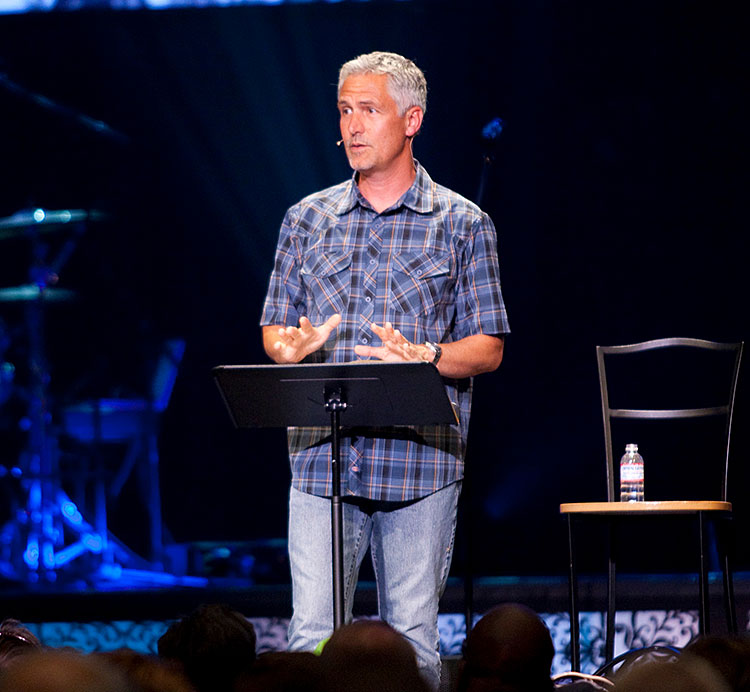By Rene Schlaepfer
When he first appears in the Bible, the character Gideon is hiding in a hole. The Midianites are ravaging the land of Israel, and Gideon has no intention of fighting them off. So he is threshing grain down in a wine press, choking on the dust, peering out occasionally to see if any bad guys are coming, then ducking back underground again.
I love the way some other translations try to capture this Hebrew phrase:
“The Lord is with you, mighty man of valor!” (NKJV)
“The Lord is with you, you mighty man of fearless courage!” (Amplified)
Wait. Gideon is hiding in a hole in the ground. Poking his head up like a scared rabbit. Yet the angel of God looks at this ancient version of Barney Fife and says, “Hello, you mighty man of fearless courage!” And indeed Gideon becomes the general who leads the people out of their oppression.
Are you speaking as did God’s angel to Gideon?
Or are you the voice of another, fallen angel?
Ask yourself this simple question:
“What sort of things am I consistently saying to others –– and to myself?”
You mighty person of valor.
Or
You weak person of probable failure.
The tongue, the Bible says, is like the rudder of a ship. It’s small, but it sets the course of your life (James 3:4,5). By your words you can set yourself up for failure. You can set your children up for failure. Your church. Your country. Your relationships.
“I feel sorry for you kids, this terrible world you are growing up in.”
“Nothing good will ever come out of Washington.”
“Churches in America are going downhill fast.”
Rudders that steer the ship.
We forget what James 3:5 says:
“By our speech we can ruin the world, turn harmony to chaos, throw mud on a reputation, send the whole world up in smoke and go up in smoke with it, smoke right from the pit of hell.” (The Message)
Here’s another way to put it: What is your meta-narrative — the way you narrate your life? What is the big picture you have about where history is going? What are you saying to yourself about yourself? That’s your rudder.
God has a plan for you.
God will empower you.
God is working in you and through you.
That’s language reflecting the meta-narrative of Hebrews 11. By saying those things, you are setting the course, steering in that direction, building up faith.
Or
This will probably never work.
You’re not capable.
You’re such a failure.
You are setting a course the other direction. Tearing down faith. Training yourself and others to see life that way.
I will never forget how when I was very young, feeling very worried about the future after the death of my father, my Swiss-Italian Aunt Pia cupped my chin in her hands and looked me in the eyes and pronounced, “I can just see the Lord in you! You are something special, Rene! I cannot wait to see how God uses you!” She said that to me when I was four. Yeah. Words change people.
I am not saying just be positive, don’t grieve, don’t lament, don’t critique. Grieving and lamenting and critiquing are actually very productive. I’m talking about eliminating speech where you indulge the worst side of your nature. Complaining speech. Grumbling speech. Critical speech.
One of my biggest concerns about Christians right now: How much we’re influenced by our society’s way of communicating. Seems every talk show host, every podcaster, every social media influencer, whether conservative or liberal or Christian or anything else, is all about controversy. Picking fights. Finding fault. Being critical. All the time. About every little thing.
But Ephesians 4:29 says,
“Do not let any unwholesome talk come out of your mouths, but only what is helpful for building others up according to their needs, that it may benefit those who listen.” (NIV)
There are Gideons all around you today, hiding in holes, afraid of the bad guys. They poke their heads up once in a while. There. Did you see them? That weak hello. That tentative email. The nervous text.
Look for ways to be their angel. Help them see themselves as the mighty men and women God created them to be.
Help them live faith forward.
•••
Rene Schlaepfer is lead pastor at Twin Lakes Church in Aptos. This is a chapter from his new book, “Faith Forward,” focusing on Hebrews 11 and published by Twin Lakes Church in 2021 –during the pandemic.

